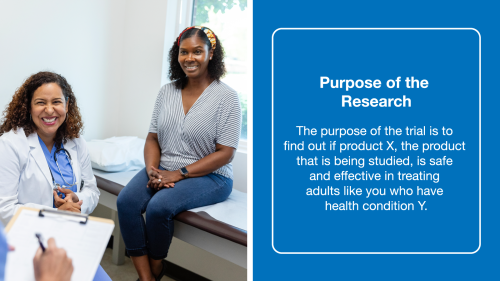FDA Works to Make Informed Consent Easier to Understand

By: Patrizia Cavazzoni, M.D., Director, Center for Drug Research and Evaluation and Hilary Marston, M.D., M.P.H., Chief Medical Officer
Each day, many individuals agree to participate in research, helping to advance scientific knowledge that will lead to new therapies and improvements in public health. It is the research community’s ethical obligation to ensure that these individuals understand the purpose and the potential risks and benefits of the research before agreeing to participate. Too often, however, informed consent forms are lengthy and difficult for potential research participants to understand. To improve this informed consent process, the U.S. Food and Drug Administration and the Office for Human Research Protections have published a draft guidance titled “Key Information and Facilitating Understanding in Informed Consent.” We are requesting public comment on the guidance by April 30, 2024.
This draft guidance provides research sponsors, investigators, and institutional review boards (IRBs) with recommendations on how to implement two proposed requirements in the FDA proposed rule, “Protection of Human Subjects and Institutional Review Boards” and the corresponding current requirements under the revised Common Rule, including that:
- Informed consent begins with key information about the research presented in a clear and concise manner.
- Informed consent as a whole be presented in a way that facilitates understanding of the reasons why someone might or might not want to participate in the research.
Requirement to Include Key Information
The draft guidance provides recommendations on how to present key information at the beginning of the informed consent document. Key information should include topics that are generally important for participants to understand, for example, the purpose of the research, the possible risks and benefits of the study, and the study’s length and procedures. The draft guidance also discusses how the inclusion of key information in consent documents could be a useful resource for current study participants.
The draft guidance encourages investigators to use key information as a guide to support the consent discussion between the investigator and potential participants. It allows for flexibility in implementing the key information requirement to ensure that the informed consent process makes information accessible for patients. The draft guidance also encourages sponsors, investigators, and IRBs to consider a variety of delivery methods for key information, such as written, oral, or media (illustrations or video) and electronic consent.
Requirement to Facilitate Understanding
The guidance recommends sponsors and clinical investigators present informed consent information in a clear, concise manner, including using plain language. For example, research on consumer understanding of prescription drug labeling information indicates that alternate formats, including a bubble format with rounded boxes capturing a discrete unit of information, may improve comprehension (See appendix of the guidance for a visual of the bubble format). Using a similar approach to present key information may make documents easier for people to read and understand. Other plain language approaches may include combining text-based and visual information, using bullets to break complex information into understandable groups, and using simple language.
Public Impact of Participating in Research
The individuals who volunteer to participate in clinical research play an integral role in advancing scientific knowledge and supporting the development of potentially life-saving therapies for patients in need. It is the role and responsibility of researchers to provide people who are considering participating in clinical trials with information about the research in a clear, comprehensible way so they can make an informed decision on whether they wish to join a clinical study.


